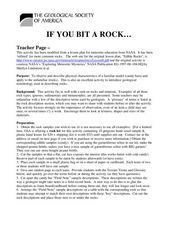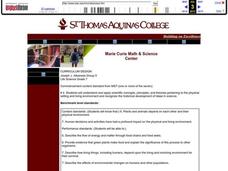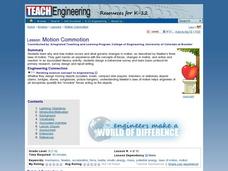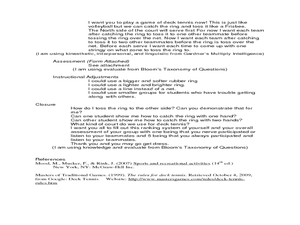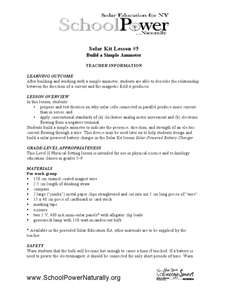Curated OER
Newton's Second Law of Motion with Simple Machines
First graders study Newton's Second Law of Motion before demonstrating the concept with a simple machine. They sing a song about speed, force, mass, and acceleration. They use simple machines to demonstrate how objects that have a higher...
Curated OER
Animal Coverings
Students compare and contrast the types of coverings found on animals. They identify a wide variety of animals in a museum room. They classify animals based on their coverings as well.
Curated OER
Pressure and Moments
Each slide gives relevant equations and a number of explanations and examples, for the situations comparing pressure or moments to external control factors. The necessary conditions for particular situations are labeled and your pupils...
Curated OER
The Invention of the Telegraph
Students study the history of telegraph invention. In this technology lesson, students build their own Morse Telegraph System. They discuss how this invention benefits the society.
Curated OER
Work and the Farm
Students listen to a lecture by the teacher about farm work and ways to use physics to make farm work easier. The machines that are highlighted include pulleys, ramps, lever, and gears. Each machine is explained in context of its use in...
Curated OER
If You Bit A Rock
Students describe the physical characteristics of a familiar model and apply it to an unfamiliar one. In this investigative lesson students become familiar with rock characteristics by participating in a candy bar activity.
Curated OER
Wig-wag Physics
High schoolers make observations on the effects of a small, medium and large weight on the movement of a wig-wag apparatus. They use their observations to develop a generalized inference of the effect weight on movement patterns.
Curated OER
Science: Exploration Tubs
First graders develop skills of scientific inquiry. They determine which objects float and which sink.
Curated OER
Physical Optics: The Wave Nature of Light
Students are introduced to the wave nature of light. In groups, they discuss Young's experiment and how diffraction and interference demonstrate the wave nature of light. Using examples, they show constructive and destructive...
Cornell University
Catapults
Ready, aim, fire! Launch to a new level of understanding as scholars build and test their own catapults. Learners explore lever design and how adjusting the fulcrum changes the outcome.
Curated OER
Simple Tensile Testing of Polymeric Films and Sheeting
Chemistry classes pretend to be consultants to a grocery story trying to decide what polymer to use for therir new non-paper bags. They prepare tensile bars and use them to test plastic film samples for strength and stretchability. Both...
Curated OER
Free Up the Ketchup!
Learners, in teams, use given materials and their knowledge of Newton's First Law to create a device that will remove a sticky ping pong ball from a 16-oz. cup (which represents ketchup stuck in a bottle.)
NOAA
Waves
Is it possible to outrun a tsunami? After watching a presentation that explains how waves and tsunamis occur, class members investigate the speed of tsunamis triggered by an earthquake.
Curated OER
TE Activity: Broken Bones
Students examine the discipline of biomedical engineering or bioengineering. They complete worksheets by participating in reading background information and completing a hands on activity. They design a prototype of a cast to set a...
Curated OER
Plants and Animals
Seventh graders discover the interconnectedness of plants and animals in ecosystems. In groups, they create a food web and discuss the problems when one link of the chain is broken. To end the lesson, they set up a balanced environment...
Curated OER
Motion Commotion!
Students explore the drawings of Rube Goldberg to design and construct a simple machine. They discuss simple machines, and using various materials and toy parts, design and construct a "Rube Goldberg" style machine to ring a bell.
Curated OER
Animals and Humans
Students identify the functions of various body parts. They participate in the "Head, Shoulders, Knees, and Toes" song, draw a picture of themselves and other mammals, and create a traced outline of their body that they add features to....
Curated OER
Deck Tennis
Seventh graders study deck tennis. In this lesson that can be adapted to teach movement, passing and positioning in any sport, 7th graders toss and catch a rubber ring, students of varying abuilities will be able to participate in this...
It's About Time
Cushioning Collisions (Computer Analysis)
Did you know the car bumper is specifically designed to save the car and not the passengers in case of an accident? Young scientists use a computer, a force probe, and a sonic ranger to experiment with external cushioning on cars.
Manchester College
Underhand Toss
A great lesson to teach the fundamentals of the underhand toss. Begin with some warm-ups, review how to do the underhand roll, and then teach the new skill of the underhand toss. The teaching activity is scaffolded and includes good...
Curated OER
Solar Kit Lesson #5 - Build a Simple Ammeter
Emerging electricians build a simple ammeter for making measurements on an electric current. They test the placement of solar cells in both series and parallel circuits and examine the magnetic field produced by the movement of electrons...
Curated OER
Water Pressure Blaster
Third graders complete an experiment to introduce them to the concept of water pressure. In this water pressure lesson plan, 3rd graders create pressure in a water bottle and observe the force of water that is created.
It's About Time
Run and Jump
Has your class wondered how fast a human could run or how high they are capable of jumping? Help them understand these concepts as they explore acceleration and use an accelerometer to make semiquantitative measurements of acceleration...
Columbus City Schools
The Mystery of Earth’s History
Every living creature can leave a fossil record, yet most fossils belong to extinct organisms rather than ones currently living. Scholars learn about dating rock layers, fossils, and the environment of the past. Pupils understand that...







